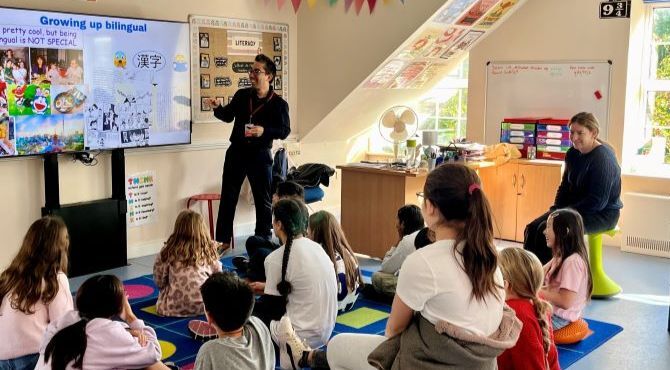Multilingualism: A Key to Thriving in Global Mobility
In today’s increasingly globalised world, Global Mobility professionals play a pivotal role in facilitating seamless transitions for individuals and families relocating across borders. Language barriers remain one of the most significant challenges to successful integration into a new country. Recognising and promoting the value of multilingualism can be instrumental in ensuring that clients not only adjust more effectively but also thrive in their new environments, enhancing both their personal and professional lives.

The latest issue of Think Global People magazine is out now!
Multilingualism as a Superpower

Prioritising multilingualism
Providing resources for client families - both students and their parents - to learn the local language while maintaining fluency in their home language can greatly influence their overall success abroad. For children, being multilingual opens doors to future academic and professional opportunities, especially in multinational organisations where cultural sensitivity is highly valued (Liyanage, 2018). It is crucial for children of globally mobile families to recognise the importance of a global and multilingual mindset, as it shapes their future prospects.Identity and wellbeing
When families relocate to a new country, mastering the local language is vital for integration, enabling individuals to navigate social and professional environments more effectively. At the same time, maintaining fluency in the home language is essential for preserving personal and familial identity, fostering a sense of belonging and emotional stability (Csata & Marácz, 2021). For children, striking a balance between the home and host country languages supports their emotional wellbeing. Fluency in multiple languages reinforces their identity and strengthens family bonds, which, in turn, facilitates smoother integration into new communities (Louf et al., 2021). Global Mobility professionals can enhance this process by promoting language learning as part of a broader wellbeing strategy, ensuring families thrive in their new environments.Conclusion
Incorporating language learning into the relocation process is about more than overcoming communication barriers; it empowers individuals and families to flourish in new cultural contexts. For Global Mobility professionals, encouraging clients to embrace multilingualism ensures smoother transitions and better long-term outcomes in their new environments. At the International School of London (ISL), we recognise the transformative power of multilingualism. Since 1972, ISL has been a global leader in international education, known for personalising learning to meet the unique needs of each student.As a premier International Baccalaureate (IB) school, ISL has gained a global reputation, particularly for its pioneering Home Language Programme, where 24 home languages are taught as a fully integrated part of the curriculum. This exceptional programme complements our extensive language acquisition and English language learning offerings, creating a holistic and enriched educational experience.ReferencesCurry, M. J., & Lillis, T. (2024). Multilingualism in academic writing for publication: Putting English in its place. Cambridge University Press.
Griggio, L., & Pittarello, S. (2020). How a multilingual project can foster and enhance international mobility. Google Books.
Csata, Z., & Marácz, L. (2021). Social inclusion and multilingualism: Linguistic justice and language policy. Social Inclusion.
Liyanage, I. (2018). Internationalization of higher education, mobility, and multilingualism. Springer.
Louf, T., Sánchez, D., & Ramasco, J. J. (2021). Capturing the diversity of multilingual societies. Physical Review Research.
Visit the International School of London Featured School page

Find out more about the Think Global People and Think Women community and events.

Subscribe to Relocate Extra, our monthly newsletter, to get all the latest international assignments and global mobility news.Relocate’s new Global Mobility Toolkit provides free information, practical advice and support for HR, global mobility managers and global teams operating overseas.
©2025 Re:locate magazine, published by Profile Locations, Spray Hill, Hastings Road, Lamberhurst, Kent TN3 8JB. All rights reserved. This publication (or any part thereof) may not be reproduced in any form without the prior written permission of Profile Locations. Profile Locations accepts no liability for the accuracy of the contents or any opinions expressed herein.









































